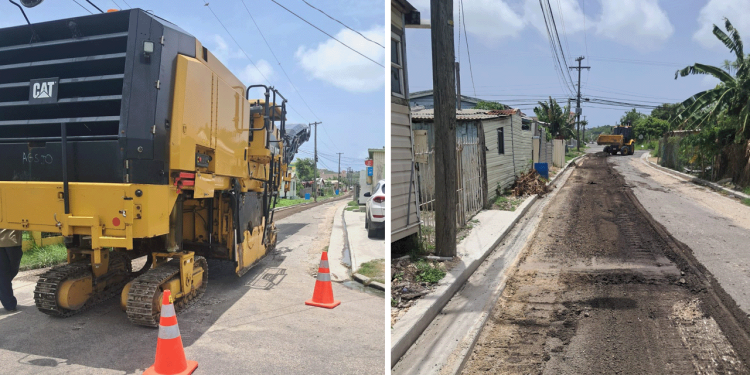The Ministry of Works is moving full speed ahead in meeting the agenda set by Cabinet to build and maintain community roads across Antigua and Barbuda.
According to Works Minister Maria Browne, quarries are working overtime to fuel roadworks. This will facilitate increased scarifying and base preparation work that must be done before laying asphalt and concrete to ensure smoother, more accessible roads.
“Each department under the MoW has a critical role to play in our infrastructure construction, from Planning and Design and Engineering to Quarries, Asphalt and Concrete Plants, Security, Transportation and Road Crews. All are integral,” Minister Browne said in a recent social media post.
Heavy-duty equipment was recently added to the fleet of vehicles, growing the capacity to pour and lay concrete roads. Several communities have already benefited, including Lightfoot, Briggins and Mount Pleasant. These roller-compacted concrete roads will provide a climate-resilient infrastructural solution for our communities.
Testing and training for the new pugmill began on Tuesday. This equipment will produce concrete on-site for roller-compacted concrete roads within communities. Additionally, the curing time for the new concrete roads will be faster.
“Aggregates in appropriate amounts are first loaded into the pugmill, then the concrete produced is shuttled out from a belt and into a truck. This special concrete mix is then poured into a spreader and lastly compacted by a roller. Maximum PSI is reached in less than 5 days compared to 20+ days curing time for regular concrete mix,” Minister Browne explained.
Meanwhile, night crews are being deployed to increase road works and reduce the traffic congestion usually present during the daytime. Recently, night works began on Herbert’s Main Road, Tanner Street and Newgate Street.
Motorists are being encouraged to follow the detours and follow all instructions given by employees controlling traffic. This will ensure safe travelling and working conditions.



